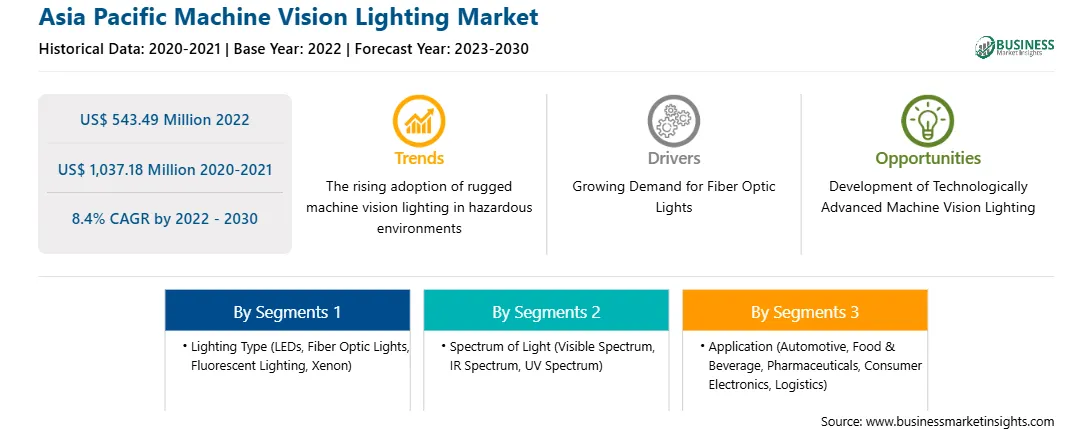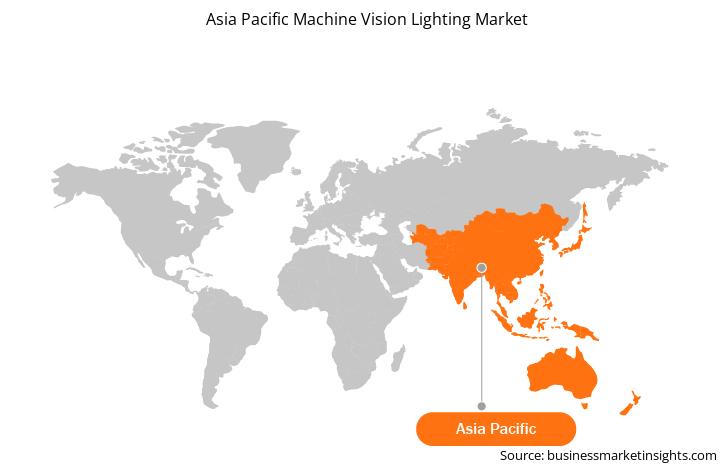The Asia Pacific machine vision lighting market was valued at US$ 543.49 million in 2022 and is expected to reach US$ 1,037.18 million by 2030; it is estimated to grow at a CAGR of 8.4% from 2022 to 2030.
In machine vision systems, LED lights have been acknowledged as a technological basis for lighting test objects. However, there is still a need for optimization. Specific customer-specific applications lack individual mechanical and optical designs. A massive number of machine vision end users require lighting with higher intensity, coupled with lower price, as well as easier integration. The vital factors comprise customer-centric adaptation possibilities in lighting geometry, numerous selections for operation, and fast delivery times with wavelengths. The requirements for illumination systems, particularly, high power density for faster production process, which needs shorter exposure times and more luminous intensity, are witnessing a high demand. Manufacturers of machine vision lighting are thus catering to this inclination by manufacturing high-power LEDs. Constant developments in LED-based lights for complex end-user applications are anticipated to provide a prosperous opportunity to the market.
Additionally, another prevailing factor in illumination technology is intelligent lighting. Intelligent or smart lighting aims to exploit the supply of illumination systems exquisitely and thus use them more efficiently and economically. Intelligent lighting can also be used for monitoring illumination systems, and this is consequently a move toward Industry 4.0. As the dynamic application data and the technical properties of illumination are permanently available in the machine vision system, end users can be notified immediately about diminishing lighting levels and other significant changes. The increasing factory automation is resulting in the adoption of smart lighting technology in machine vision systems.
The manufacturing industry in the developing countries of APAC has experienced a seismic shift over the years, as they have established themselves as serious players, which has subsequently created a threat for reputable manufacturers with their firm foothold in the developed nations. The Asian manufacturing sector is known to quickly adopt innovation accelerators, including robotics and emerging cloud and mobility technologies. Over the years, the APAC region’s manufacturing spending has grown significantly and is further anticipated to grow at the highest estimated growth rate. This dramatic growth in manufacturing spending and the adoption of new technologies are the key factors fueling the demand for machine vision systems.
APAC has become a universal manufacturing hub with the presence of various manufacturing industries. Among China’s evolution into a high-skilled manufacturing hub, other emerging countries such as India, Vietnam, Taiwan, and South Korea are attracting several businesses that are in a quest to relocate their low to medium-skilled manufacturing facilities to neighboring countries, offering lower labor costs. Further, China is the largest producer of passenger cars in the world, followed by Japan, India, and South Korea. This would further propel the machine vision lighting market growth in the country. Also, the consumer electronics manufacturing industry in APAC is leading globally. These industries’ presence is anticipated to positively influence the machine vision lighting market. On the other hand, China, the largest manufacturing hub, is experiencing a rise in labor costs due to its aging population. As a result, manufacturing enterprises from developed countries seek to invest in other Southeast Asian countries to take advantage of improving infrastructure, rising domestic consumption, and lower costs in those countries. Furthermore, the demand for consumer electronic products, which is majorly driven by rising disposable incomes, price deflation, and innovation, particularly in the emerging Asian markets, is projected to encourage the manufacturing industries in APAC to adopt newer technologies in order to synchronize with the consumers’ expectations. Also, the presence of a strong semiconductor industry in APAC is propelling the growth of machine vision lighting market.
Strategic insights for the Asia Pacific Machine Vision Lighting provides data-driven analysis of the industry landscape, including current trends, key players, and regional nuances. These insights offer actionable recommendations, enabling readers to differentiate themselves from competitors by identifying untapped segments or developing unique value propositions. Leveraging data analytics, these insights help industry players anticipate the market shifts, whether investors, manufacturers, or other stakeholders. A future-oriented perspective is essential, helping stakeholders anticipate market shifts and position themselves for long-term success in this dynamic region. Ultimately, effective strategic insights empower readers to make informed decisions that drive profitability and achieve their business objectives within the market.

| Report Attribute | Details |
|---|---|
| Market size in 2022 | US$ 543.49 Million |
| Market Size by 2030 | US$ 1,037.18 Million |
| Global CAGR (2022 - 2030) | 8.4% |
| Historical Data | 2020-2021 |
| Forecast period | 2023-2030 |
| Segments Covered |
By Lighting Type
|
| Regions and Countries Covered | Asia-Pacific
|
| Market leaders and key company profiles |
The geographic scope of the Asia Pacific Machine Vision Lighting refers to the specific areas in which a business operates and competes. Understanding local distinctions, such as diverse consumer preferences (e.g., demand for specific plug types or battery backup durations), varying economic conditions, and regulatory environments, is crucial for tailoring strategies to specific markets. Businesses can expand their reach by identifying underserved areas or adapting their offerings to meet local demands. A clear market focus allows for more effective resource allocation, targeted marketing campaigns, and better positioning against local competitors, ultimately driving growth in those targeted areas.

The Asia Pacific machine vision lighting market is segmented based on lighting type, spectrum of light, application, and country. Based on lighting type, the Asia Pacific machine vision lighting market is categorized into LEDs, fiber optic lights (halogen), fluorescent lighting, xenon, and others. The LEDs segment held the largest market share in 2022.
In terms of spectrum of light, the Asia Pacific machine vision lighting market is categorized into visible spectrum, IR spectrum, and UV spectrum. The visible spectrum segment held the largest market share in 2022.
Based on application, the Asia Pacific machine vision lighting market is categorized into automotive, food & beverage, pharmaceuticals, consumer electronics, logistics, and others. The automotive segment held the largest market share in 2022.
By country, the Asia Pacific machine vision lighting market is segmented into China, Japan, South Korea, India, Australia, and the Rest of Asia Pacific. China dominated the Asia Pacific machine vision lighting market share in 2022.
Schott AG, Basler AG, Exactera LLC, Spectrum Illumination, Smart Vision Lights, CCS Inc, Omron Microscan Systems Inc, wenglor sensoric GmbH, Keyence Corp, and Cognex Corp are some of the leading companies operating in the Asia Pacific machine vision lighting market.
The Asia Pacific Machine Vision Lighting Market is valued at US$ 543.49 Million in 2022, it is projected to reach US$ 1,037.18 Million by 2030.
As per our report Asia Pacific Machine Vision Lighting Market, the market size is valued at US$ 543.49 Million in 2022, projecting it to reach US$ 1,037.18 Million by 2030. This translates to a CAGR of approximately 8.4% during the forecast period.
The Asia Pacific Machine Vision Lighting Market report typically cover these key segments-
The historic period, base year, and forecast period can vary slightly depending on the specific market research report. However, for the Asia Pacific Machine Vision Lighting Market report:
The Asia Pacific Machine Vision Lighting Market is populated by several key players, each contributing to its growth and innovation. Some of the major players include:
The Asia Pacific Machine Vision Lighting Market report is valuable for diverse stakeholders, including:
Essentially, anyone involved in or considering involvement in the Asia Pacific Machine Vision Lighting Market value chain can benefit from the information contained in a comprehensive market report.